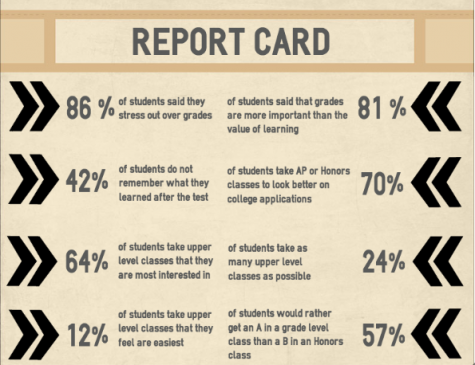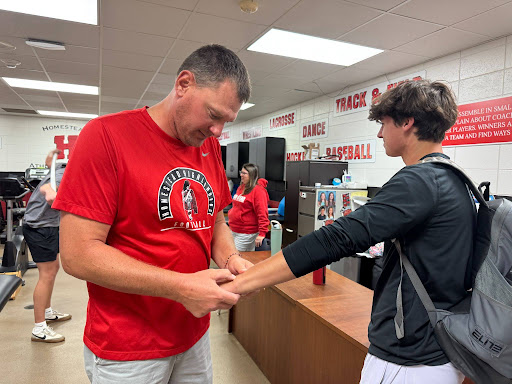Quest for grades replaces desire to learn
As the pressure for an A rises, students may experience disadvantageous effects.
As the deadline for college applications swiftly approaches, students feel dead pressed to recall the myriad of extracurriculars they participated in, the multitude of awards they acquired and all of the countless hours of volunteer work they completed. Juniors and seniors alike spend hours preparing for the ACT, shooting for their desired score, while students across Homestead compromise sleep and sanity to achieve contemporary society’s symbol of intelligence and success: an A.
Out of 100 Homestead students, 86 percent said that they stress out over grades. “Grades are very important to me. It is so stressed that I need to have As for college and to maintain my GPA,” Victoria Shyvetser, senior, said. According to Mr. David Savage, physics teacher, “I think that there are many reasons that grades are of such importance. Much of that is because that is and has been our measure of ‘success’ for many years and has been the measure that students are used to.”
An anonymous female source believes that the pressure for As comes from many different places, including parents, peers and teachers. The most prominent pressure, however, comes from the desire to attend the right college. “Without good grades, I will not be able to get into the college I want and I will not be as happy and successful as I want to be,” the source said. The source continued to express that the urge to attend a renowned college has become her main motivation to study, join clubs and do volunteer work. “Although I enjoy some of the stuff I do, I wouldn’t put myself through so much stress if the pressure to get into a good college wasn’t so imminent. Tackling sports, clubs, hard classes and volunteer work isn’t really enjoyable to do all at once, so the only motivation is college,” the source said.
As the emphasis on the grade itself has skyrocketed, the extent to which students value what they learned has plummeted.
Eighty one percent of Homestead students admitted that grades and test scores are more important to them than the value of learning.
According to Alfie Kohn, a writer and lecturer on education, parenting and human behavior, students who are solely motivated by grades tend to experience adverse effects. “Grades tend to diminish students’ interest in whatever they’re learning,” Kohn said. Kohn also expressed that, “Grades create a preference for the easiest possible task” and that “grades tend to reduce the quality of students’ thinking.” According to Kohn, “The more students are led to focus on how well they’re doing, the less engaged they tend to be with what they’re doing.”

Katie Writz, junior, agrees that focusing solely on grades can be detrimental to students’ futures. “Grades have become so much more meaningful than actually learning the material,” Writz said. “This may cause us to be less prepared for our future.” According to the aforementioned survey, 42 percent of Homestead students do not remember what they learned after they take the test. Mr. Scott Heibler, biology teacher, agrees that this can impact the amount of information students are able to learn throughout the course of their education. “If students aren’t remembering what they learn in high school, they are going to have to relearn it in college when they are paying for it,” Mr. Heibler said. “The less time you spend learning the things you should have already remembered, the more time you can spend on learning new things.”
Mr. Savage believes that developing the “growth mindset” is a key way in which students can produce their desired grades while simultaneously learning the material and developing life skills. The growth mindset is a theory developed by Dr. Carol Dweck, a professor at Stanford University and author of Mindset. According to Mindset Online, the principle of the growth mindset is that students “believe that their most basic abilities can be developed through dedication and hard work—brains and talent are just the starting point. This view creates a love of learning and a resilience that is essential for great accomplishment.” As an advocate of the growth mindset, Mr. Savage believes that focusing on learning the actual material instead of focusing on the grade can subsequently produce the desired grade. “We have found, in the past, students who actually accept and develop a growth mindset not only learn how to learn and grow but find that the grades that they want end up happening anyway.”
Dweck believes that the growth mindset is a crucial key to success, and that with the growth mindset, everyone can perform to their best abilities. “Did I win? Did I lose? Those are the wrong questions,” Dweck said. “The correct question is: Did I make my best effort?” [If so], you may be outscored, but you will never lose.”






